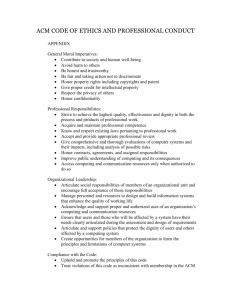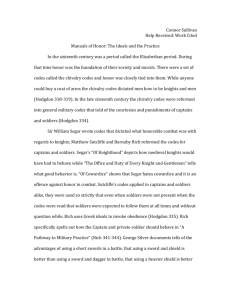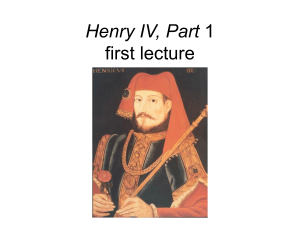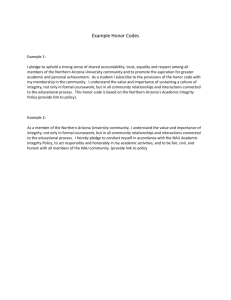A Measure of Honor in Words
advertisement
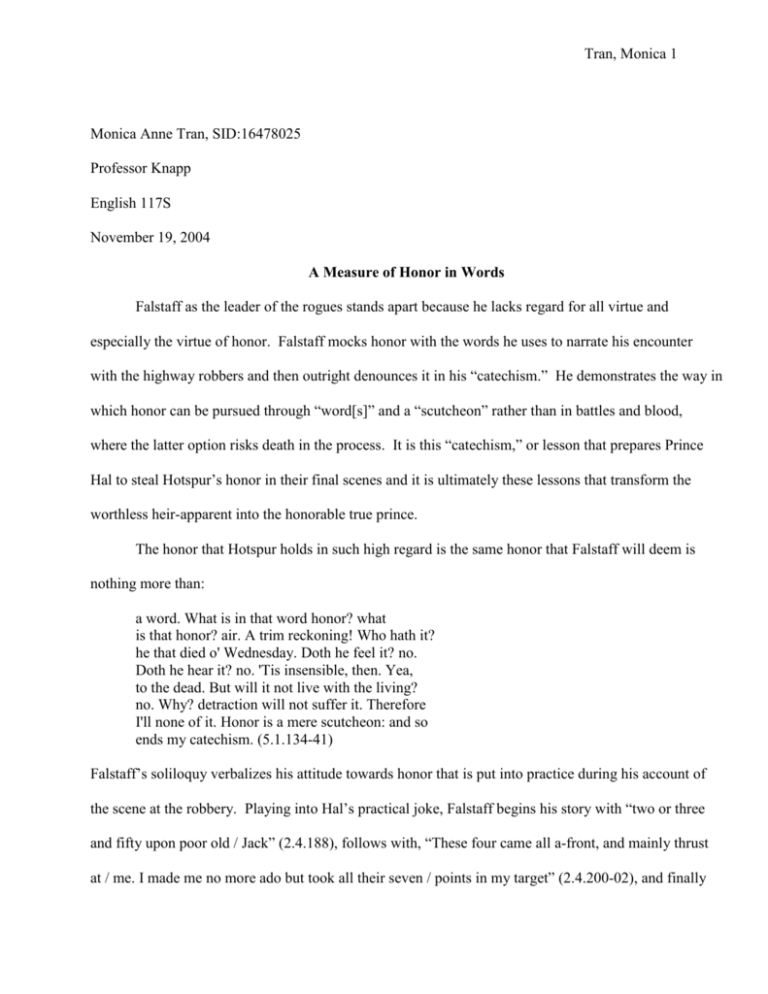
Tran, Monica 1 Monica Anne Tran, SID:16478025 Professor Knapp English 117S November 19, 2004 A Measure of Honor in Words Falstaff as the leader of the rogues stands apart because he lacks regard for all virtue and especially the virtue of honor. Falstaff mocks honor with the words he uses to narrate his encounter with the highway robbers and then outright denounces it in his “catechism.” He demonstrates the way in which honor can be pursued through “word[s]” and a “scutcheon” rather than in battles and blood, where the latter option risks death in the process. It is this “catechism,” or lesson that prepares Prince Hal to steal Hotspur’s honor in their final scenes and it is ultimately these lessons that transform the worthless heir-apparent into the honorable true prince. The honor that Hotspur holds in such high regard is the same honor that Falstaff will deem is nothing more than: a word. What is in that word honor? what is that honor? air. A trim reckoning! Who hath it? he that died o' Wednesday. Doth he feel it? no. Doth he hear it? no. 'Tis insensible, then. Yea, to the dead. But will it not live with the living? no. Why? detraction will not suffer it. Therefore I'll none of it. Honor is a mere scutcheon: and so ends my catechism. (5.1.134-41) Falstaff’s soliloquy verbalizes his attitude towards honor that is put into practice during his account of the scene at the robbery. Playing into Hal’s practical joke, Falstaff begins his story with “two or three and fifty upon poor old / Jack” (2.4.188), follows with, “These four came all a-front, and mainly thrust at / me. I made me no more ado but took all their seven / points in my target” (2.4.200-02), and finally Tran, Monica 2 ends, “with a thought seven of / the eleven I paid” (2.4.217-18). Falstaff proves himself to be the quintessential milites gloriousus, the literary stock character of the braggart soldier who is all “words” on the outside and pumped full of hot “air” on the inside. Falstaff directly challenges honor by mocking it with his cowardice. In the first place, he is not actually met by eleven robbers and in the second, he has not achieved any of the feats he has professed. The only valuation of Falstaff’s honor at this scene is a measure of the “words” that comprise the story he makes up. The level of honor that Falstaff wishes to acquire is achieved through a verbal proliferation starting with “four” and ending at “eleven.” The more men that he fights, the more honorable he perceives his winnings to be. Falstaff’s story is nothing more than a product of his imagination where the thieves are fictitious characters existing only by his “word[s],” which are made up out of thin “air.” Falstaff is fully resolved to his definition and finds that “word[s]” are more valuable in formulating honor than the actions that could win it. Falstaff’s use of language is best described as superfluous. Falstaff opens the scene cursing, “A plague of all cowards“ (2.4.114) and ends with, “Instinct is a great matter; I was now a / coward on instinct” (2.4.273). Having been revealed a coward by Hal, Falstaff stands to suffer the “plague” he has just cast upon himself—a figurative death. However, Falstaff reinterprets his own words and redeems his honor by the addition of two simple words. He is proven a coward, but he is now a “coward on instinct.” “On instinct” has saved Falstaff’s honor just as the verbal addition of seven men bolstered it in the first place. If honor is nothing more than a function of “words,” it follows that the acquisition of honor is as easily found in language as it is in battle. This is the first lesson of honor that Hal takes away from Falstaff and it will be a lesson that is well applied in redemption of his own lost honors. Vernon’s account that Hal has only “trimm’d up [Hotspur’s] praises with a princely tongue” (5.2.56) before their reckoning on the battlefield, is an application of language that Hal has learned from Falstaff. In a display of polity, Hal tells Worcester and Vernon that: Tran, Monica 3 The Prince of Wales doth join with all the world In praise of Henry Percy: by my hopes, This present enterprise set off his head, I do not think a braver gentleman, More active-valiant or more valiant-young, More daring or more bold, is now alive To grace this latter age with noble deeds. (5.1.83-100) Following from Falstaff’s principles of “honor,” Hal learns to multiply his words in praise Hotspur, so that he may later steal those praises for himself. Although Hal differs from Falstaff because he achieves his honor through action, his use of language advances the amount of honor which can be potentially won. Percy is “braver,” “more active-valiant,” “more daring,” “more bold,” and a more worthy opponent to be challenged. Each successive use of the word “more” raises the stakes of honor in the same way that each additional thief does for Falstaff. However, Falstaff pits himself against eleven and must expend the effort to kill eleven—a measure of honor in quantities. Hal achieves the same honor by killing just one man in whom he has concentrated the many qualities of honor. By conquering the pinnacle, the “More active-valiant or more valiant-young, / More daring or more bold,” Hal steals, in one singular battle, the honors that Hotspur had to win in many. Hal follows in the footsteps of Falstaff through his use of superlatives, mere “words,” that increase the potential for honor, but differs by taking the process one step further and actually winning the honor that he bolsters in language. To be honorable is the same as to appear honorable, not only in words, but also in outward demeanor. Falstaff demonstrates that “Honor is a mere scrutcheon,” merely a “garment” to be worn, through Bardolph’s testimonial that begins, “Yea, and to tickle our noses with spear-grass to / make them bleed, and then to beslubber our garments / with it and swear it was the blood of true men” (2.4.309-11). The path to honor may be paved with shows of courage, but it also wrought with the danger of injury. For Falstaff, it is this perceived danger that is the most significant valuation of honor. It is not the actual acts of heroism that are at stake, but rather the physical marker of wounds worn in Tran, Monica 4 “blood.” Honor is a trait that needs to be affirmed by an external party and as such, it is a quality that should be visible and apparent on the outside. If there were no other characters to witness Hotspur at battle, his accomplishments would not be acknowledged and no one could hold his honor in reverence. Since there are no witnesses to testify to Falstaff’s honor, he chooses to instead literally wear his honor on his sleeve to show that he has incurred the risks of fighting. The blood upon Falstaff’s clothes is a probable product of battle and if thought legitimate, could certainly increase the honors to be won. As his own enemy, Falstaff places himself in full control of the “beslubber[ing]” of his blood, where a nosebleed accomplishes the same purpose as a knife to the heart. However, since Falstaff has already proven false, his story is refuted and his injuries provide no further proof of his honor. On the other hand, Hal is not marred by the same reputation and thus will be able to strategically implement Falstaff’s lesson in his own plight for honor. Although Hal emerges from the battle with Hotspur newly honorable, he does not profess to possess a genuine honor won through noble deeds. At the reconciliation with his father, Hal tells Henry IV that there will be a day: When I will wear a garment all of blood And stain my favors in a bloody mask, Which, wash'd away, shall scour my shame with it” (3.2.138-41) Hal is in agreement with Falstaff that “Honor is a mere scutcheon” to be worn as a “garment.” Going into battle with his enemy, Hal only cites that he will “wear a garment all of blood” and “stain [his] favours in a bloody mask.” To “wear a garment,” or a “mask” is to put honor on display in a way that is equivalent to wearing a “scutcheon,” or coat of arms for identification to war. Both a “garment” and “scutcheon” depict honor as nothing more than an article of decorum meant for external recognition. Hal revisits Falstaff’s images of “blood” to emphasize the idea that honor necessarily calls for suffering. Blood is chosen to represent war because it is a symbol of the inherent risks of fighting. The fight for Tran, Monica 5 honor requires a willingness to spill blood and risk dying for that same honor—the version of honor that governs and eventually consumes Hotspur. Since his honor constantly beckons to be wagered in battles, it is a plight that can only end in death. Even at his last words, Hotspur dies lamenting, “I better brook the loss of brittle life / Than those proud titles thou hast won of me” (5.4.77-78). Although Percy does not realize that honor has made a victim of him, it has always been apparent to Falstaff who says, “But will it not live with the living? / no. Why? detraction will not suffer it” (5.1.139). Percy dies valuing his honors over his life without even grasping that there would be no honor if there were no body attached to it. Honor controls Hotspur to the very end where he dies “suffer[ing]” honor’s “detraction.” The benefit of seeing honor as an article of clothing is that it can be removed and worn at one’s convenience. The ability to “wear” honor allows man to retain agency over the force and subsequently manipulate it for his own devices. It is a virtue that is worn by Falstaff and Hal and a virtue that wears Hotspur to his death. Hotspur is a testament to Falstaff’s “catechism” that honor only lies with “he that died o’ Wednesday”—a lesson that teaches Hal to only wear and speak the words of honor rather than be its minion in death. Having previously cited that he will one day “make this northern youth exchange / His glorious deeds for my indignities” (3.2.145-46), Hal ends the play by coupling his words in culmination of his master plan. Hal’s completion of Hotspur’s words that he will be food “For worms” marks the point in the play where Hal is reborn as the prodigal son after having won Hotspur’s honors for his own. Hal begins: For worms, brave Percy: fare thee well, great heart! Ill-weaved ambition, how much art thou shrunk… And, even in thy behalf, I'll thank myself For doing these fair rites of tenderness. Adieu, and take thy praise with thee to heaven! Thy ignominy sleep with thee in the grave, But not remember'd in thy epitaph! (5.4.87-101) Tran, Monica 6 Although Hal has succeeded in completing the action of killing Hotspur, the actual transfer of honor is reduced to the two words of “For worms.” Hal understands that there is no inherent value in possessing honor—once it is out of sight, it is out of mind. The “praise” that Hotspur takes with him to heaven was never anything more than the words of men confirming that he is indeed honorable. Now that he is dead, Hotspur can no longer hear those words and can take to his grave only the “ignominy” of his final loss. He will not even be “remember'd in [his] epitaph” for the great victories he has won for Wales— there will be no words remaining to mark his greatness. Learning from Falstaff’s scenes where he tries to lay out his honor in words and wear it like a “scrutcheon,” Hal uses his showdown with Hotspur to reconcile the two meanings of honor that have thus been presented. Honor is first a virtue whose worth is measured in words and can thus be stolen with words; and it is then a virtue that calls for external recognition or the “word” (testimonial) of another man to affirm that honor. Even at the conclusion of the play, Falstaff tries to steal Hal’s honor by professing that he is the one who has killed Hotspur. Falstaff reiterates his lessons for the true prince by playing up his honor with words and hoping that the men will take his “word” in earnest. Although it is at first these lessons that implore Hal to take up Falstaff’s company, it is also this lack of regard for honor that prompts Hal to later banish Falstaff from his company. Falstaff’s disdain for honor is a part of the bigger problem that Falstaff refuses to be ruled by anything at all. In being compelled by no higher force himself, Falstaff poses a threat to Hal’s reign because of his propensity for treachery. Although Falstaff’s lessons guide Hal in seeking his honor, these same lessons then lead to Falstaff’s defeat. Falstaff as a teacher shows Hal how to retain agency and subsequently survive the plight for honor. Hal as a student takes his education one step further and learns that, like Falstaff, he must be loyal only to himself. Hal as a king recofnizes Falstaff as a subject over which he cannot rule and thus, a threat that to be eradicated.

